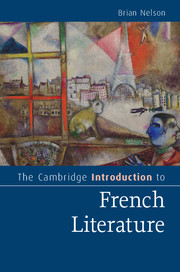Book contents
- Frontmatter
- Dedication
- Contents
- Preface
- Acknowledgements
- Chronology
- 1 Villon: a dying man
- 2 Rabelais: the uses of laughter
- 3 Montaigne: self-portrait
- 4 Corneille: heroes and kings
- 5 Racine: in the labyrinth
- 6 Molière: new forms of comedy
- 7 La Fontaine: the power of fables/fables of power
- 8 Madame de Lafayette: the birth of the modern novel
- 9 Voltaire: the case for tolerance
- 10 Rousseau: man of feeling
- 11 Diderot: the enlightened sceptic
- 12 Laclos: dangerous liaisons
- 13 Stendhal: the pursuit of happiness
- 14 Balzac: ‘All is true’
- 15 Hugo: the divine stenographer
- 16 Baudelaire: the streets of Paris
- 17 Flaubert: the narrator vanishes
- 18 Zola: the poetry of the real
- 19 Huysmans: against nature
- 20 Mallarmé: the magic of words
- 21 Rimbaud: somebody else
- 22 Proust: the self, time and art
- 23 Jarry: the art of provocation
- 24 Apollinaire: impresario of the new
- 25 Breton … Company: Surrealism
- 26 Céline: night journey
- 27 Sartre: writing in the world
- 28 Camus: a moral voice
- 29 Beckett: filling the silence
- 30 French literature into the twenty-first century
- Notes
- Further reading
- Index of authors and titles
- Index of genres, movements and concepts
- Cambridge Introductions to …
- References
27 - Sartre: writing in the world
Published online by Cambridge University Press: 05 July 2015
- Frontmatter
- Dedication
- Contents
- Preface
- Acknowledgements
- Chronology
- 1 Villon: a dying man
- 2 Rabelais: the uses of laughter
- 3 Montaigne: self-portrait
- 4 Corneille: heroes and kings
- 5 Racine: in the labyrinth
- 6 Molière: new forms of comedy
- 7 La Fontaine: the power of fables/fables of power
- 8 Madame de Lafayette: the birth of the modern novel
- 9 Voltaire: the case for tolerance
- 10 Rousseau: man of feeling
- 11 Diderot: the enlightened sceptic
- 12 Laclos: dangerous liaisons
- 13 Stendhal: the pursuit of happiness
- 14 Balzac: ‘All is true’
- 15 Hugo: the divine stenographer
- 16 Baudelaire: the streets of Paris
- 17 Flaubert: the narrator vanishes
- 18 Zola: the poetry of the real
- 19 Huysmans: against nature
- 20 Mallarmé: the magic of words
- 21 Rimbaud: somebody else
- 22 Proust: the self, time and art
- 23 Jarry: the art of provocation
- 24 Apollinaire: impresario of the new
- 25 Breton … Company: Surrealism
- 26 Céline: night journey
- 27 Sartre: writing in the world
- 28 Camus: a moral voice
- 29 Beckett: filling the silence
- 30 French literature into the twenty-first century
- Notes
- Further reading
- Index of authors and titles
- Index of genres, movements and concepts
- Cambridge Introductions to …
- References
Summary
… no society can complain of its intellectuals without accusing itself, for it has the intellectuals it makes.
– Sartre, ‘A Plea for Intellectuals’When Jean-Paul Sartre (1905–1980) was arrested in 1970 for distributing seditious political literature in the streets of Paris, President de Gaulle vetoed the move to hold him in prison, reportedly saying: ‘You don't put Voltaire in prison.’ What he was alluding to by his comparison was that both men made themselves the radical consciences of their respective societies. Sartre – at once a philosopher, novelist, dramatist, literary critic, art critic, political theorist, political essayist and political activist – was as versatile and prolific as Voltaire, but more original. He dominated the intellectual life of the mid-twentieth century. He was the public intellectual par excellence.
Early years
The essential theme of Sartre's life and work is liberty. As a child, his rejection of authority was expressed in his rejection of his tyrannical grandfather, Charles Schweitzer, who ran a German school in Paris. He chose to become a writer precisely because his grandfather solemnly warned him against it. Sartre's brilliant account of his childhood, and of his relationship to culture and language, in Words (Les Mots, 1964) sheds much light on his later development. Sartre's father died when his son was fifteen months old, and Sartre and his mother were reintegrated into his grandfather's household, where they were both called ‘the children’ and brought up together almost as brother and sister. In Words he lays bare the forces that worked upon his consciousness a child, especially the bourgeois ideology embodied in his grandfather. The book is the judgement of the man on the child, but it is even more a judgement on a society that bred extreme forms of self-deception. Sartre presents himself as a young boy constrained to fit into an old-fashioned household and describes how he was constantly acting a part to please a dictatorial old man. At the heart of Sartre's work generally is a preoccupation with all forms of hypocrisy; playing roles, pretending to be someone or something one is not, came to represent a major crime in his eyes.
- Type
- Chapter
- Information
- The Cambridge Introduction to French Literature , pp. 200 - 207Publisher: Cambridge University PressPrint publication year: 2015

